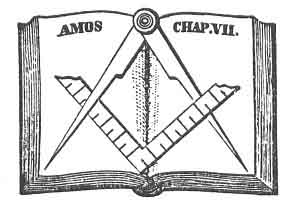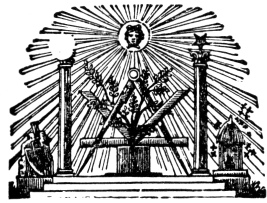Yet, notwithstanding the caution with which the founder as yet withholds certain books from the hands of the Minerval, it is clear from the very assortment of the libraries of the Order, that he does not hesitate at giving the pupils a certain number directly tending to the grand object, and particularly those which may create a contempt for religion. He wishes much to see an impartial history of the Church; and he even proposes hereafter to
p. 442
publish one himself, or at least to contribute many articles toward such a work. He calls the attention of the young adepts to Sarpi, to Le Bret’s arsenal of calumnies, and in short to all that has been written against Religious Orders. 6 He had even put on the list those impious works which appeared under the name of Freret. He seemed to have forgotten for a moment his ordinary prudence; but, warned of it by Knigge, he corrected his error. 7 Many other books, however, were to be comprehended in the Minerval library, which were to disguise the object of it; and it was one duty of the Presiding Illuminee to select such as would gradually direct his pupils to the grand object of the Sect; always remembering, that the most impious and seditious were reserved for the higher degrees. Should the President chance to find the System of Nature, Natural Polity, Helvetius on Man, or other such books, in the hands of his pupil, he was to avoid showing his pleasure or displeasure, and leave them. 8 In short, it is in the Minerval schools that the teachers are in a particular manner to practise that great art of making the adepts rather as it were invent than learn the principles of the Order; because they will then, looking upon them as the offspring of their own genius, more strongly adhere to them.
There is yet another scheme in these schools for attaching the young adepts to the Order.—Every brother is, at his first reception, to declare to what art or science he means principally to apply, unless his station, genius, or particular circumstances, debar him from the literary career; in which latter case, pecuniary contributions are to be an equivalent for those services which his talents cannot contribute. 9 If the Brethren adopt literary pursuits, then the Order enters into engagements to furnish them with all possible assistance to forward their undertakings in the art or science on which they shall have determined; unless they should have chosen Theology or Jurisprudence, two sciences which the Order absolutely excepts from any such agreement. 10
Their succours for the Minerval have a two-fold tendency. On the one side, they serve to prove that the adept does not neglect the science he has determined on, as he is to give an annual account of the discoveries he has made, and of the authors from which he has made selections. On the other hand, the brethren following the same branches of study are desired to help him with all the means in their power. Should he meet with difficulties which he cannot solve, he may apply to his Superior, who will either solve them himself, or send them to other members of the Order, who, better versed in those sciences, and bound to enlighten their Brethren, will send the required solutions. 11
That his degree of Minveral may have all the appearances of a literary society, the Superiors annually propose some question for a public composition. The answers or dissertations are judged as in academies, and the discourse which obtains the prize is printed at the expence of the Order. The same advantages are held out to all adepts who wish to publish their works, provided they are not foreign to the views of the Founder. 12—They are sure to coincide with his intentions should they be of the nature of those which he calls pasquils, or such as would create mirth among the people at the expense
p. 443
of the priesthood, and of religious truths; such as parodies on the Lamentations of Jeremiah, or burlesque imitations of the Prophets; in a word, all such satires as dispose the people to the grand object of the Sect. The Minerval can give no better proofs than these of his progress. The Sect has booksellers who put these works into circulation, and the profits are transmitted to the coffers of the Order.

Moe is the founder of GnosticWarrior.com. He is a father, husband, author, martial arts black belt, and an expert in Gnosticism, the occult, and esotericism.




